Leadership & Management Approaches in Operations: BCG Analysis
VerifiedAdded on 2020/07/23
|18
|5667
|38
Report
AI Summary
This report provides an analysis of leadership and management principles within the context of operations management, using the Boston Consulting Group (BCG) as a case study. It defines and compares the characteristics and roles of leaders and managers, examining their functions in different situational contexts. The report applies various leadership theories and models, including situational, systems leadership, and contingency approaches, to operational scenarios. It also discusses key approaches to operations management and its importance in achieving business objectives, while considering the impact of the business environment on operational decisions. The document concludes by summarizing the critical factors influencing effective leadership and management in operational settings. Access more solved assignments and study resources on Desklib.
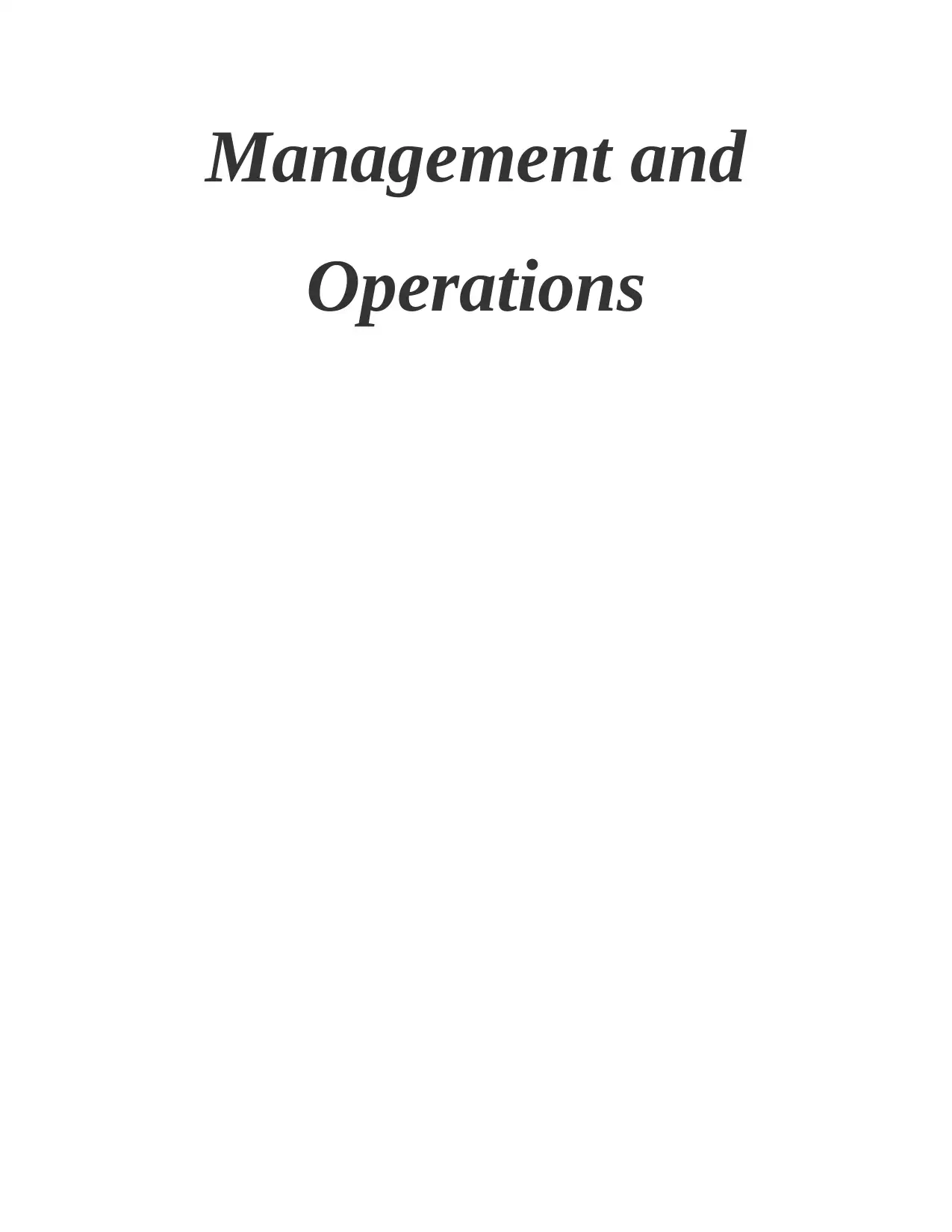
Management and
Operations
Operations
Paraphrase This Document
Need a fresh take? Get an instant paraphrase of this document with our AI Paraphraser

Table of Contents
INTRODUCTION...........................................................................................................................1
TASK 1............................................................................................................................................1
P1 Define and compare the characteristic and roles of a leaders and manager......................1
TASK 2............................................................................................................................................5
P2 Examine how the role of a leader and function of a manager apply in different situational
contexts...................................................................................................................................5
P3 Apply different theories and models of approaches including situational, systems
leadership and contingency....................................................................................................7
TASK 3............................................................................................................................................9
P4 Key approaches to Operation management.......................................................................9
P5 Importance and values of operation management in achieving objectives.....................10
TASK 4..........................................................................................................................................12
P6 Factors of business environment that impacts upon operational management...............12
CONCLUSION..............................................................................................................................14
REFERENCES..............................................................................................................................15
INTRODUCTION...........................................................................................................................1
TASK 1............................................................................................................................................1
P1 Define and compare the characteristic and roles of a leaders and manager......................1
TASK 2............................................................................................................................................5
P2 Examine how the role of a leader and function of a manager apply in different situational
contexts...................................................................................................................................5
P3 Apply different theories and models of approaches including situational, systems
leadership and contingency....................................................................................................7
TASK 3............................................................................................................................................9
P4 Key approaches to Operation management.......................................................................9
P5 Importance and values of operation management in achieving objectives.....................10
TASK 4..........................................................................................................................................12
P6 Factors of business environment that impacts upon operational management...............12
CONCLUSION..............................................................................................................................14
REFERENCES..............................................................................................................................15

⊘ This is a preview!⊘
Do you want full access?
Subscribe today to unlock all pages.

Trusted by 1+ million students worldwide
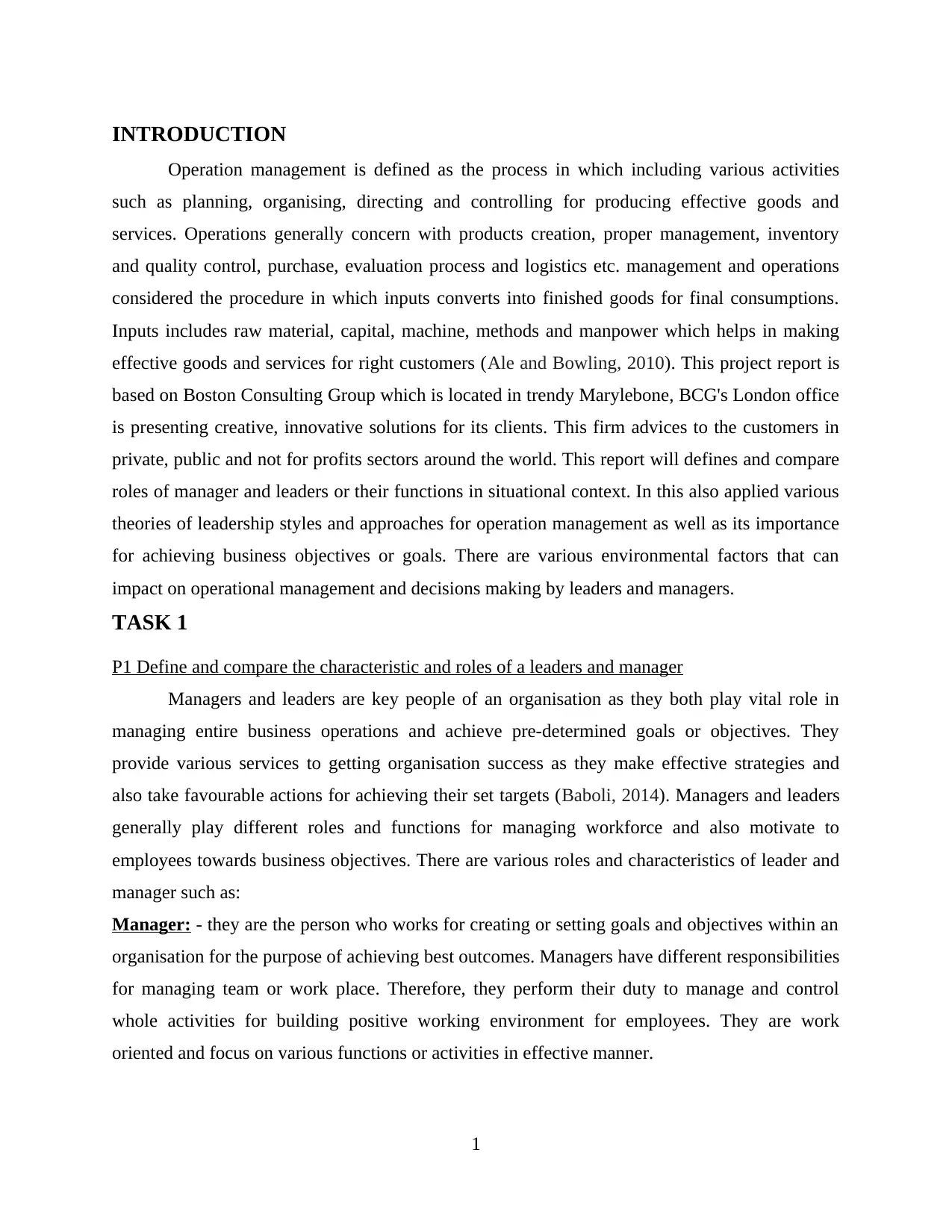
INTRODUCTION
Operation management is defined as the process in which including various activities
such as planning, organising, directing and controlling for producing effective goods and
services. Operations generally concern with products creation, proper management, inventory
and quality control, purchase, evaluation process and logistics etc. management and operations
considered the procedure in which inputs converts into finished goods for final consumptions.
Inputs includes raw material, capital, machine, methods and manpower which helps in making
effective goods and services for right customers (Ale and Bowling, 2010). This project report is
based on Boston Consulting Group which is located in trendy Marylebone, BCG's London office
is presenting creative, innovative solutions for its clients. This firm advices to the customers in
private, public and not for profits sectors around the world. This report will defines and compare
roles of manager and leaders or their functions in situational context. In this also applied various
theories of leadership styles and approaches for operation management as well as its importance
for achieving business objectives or goals. There are various environmental factors that can
impact on operational management and decisions making by leaders and managers.
TASK 1
P1 Define and compare the characteristic and roles of a leaders and manager
Managers and leaders are key people of an organisation as they both play vital role in
managing entire business operations and achieve pre-determined goals or objectives. They
provide various services to getting organisation success as they make effective strategies and
also take favourable actions for achieving their set targets (Baboli, 2014). Managers and leaders
generally play different roles and functions for managing workforce and also motivate to
employees towards business objectives. There are various roles and characteristics of leader and
manager such as:
Manager: - they are the person who works for creating or setting goals and objectives within an
organisation for the purpose of achieving best outcomes. Managers have different responsibilities
for managing team or work place. Therefore, they perform their duty to manage and control
whole activities for building positive working environment for employees. They are work
oriented and focus on various functions or activities in effective manner.
1
Operation management is defined as the process in which including various activities
such as planning, organising, directing and controlling for producing effective goods and
services. Operations generally concern with products creation, proper management, inventory
and quality control, purchase, evaluation process and logistics etc. management and operations
considered the procedure in which inputs converts into finished goods for final consumptions.
Inputs includes raw material, capital, machine, methods and manpower which helps in making
effective goods and services for right customers (Ale and Bowling, 2010). This project report is
based on Boston Consulting Group which is located in trendy Marylebone, BCG's London office
is presenting creative, innovative solutions for its clients. This firm advices to the customers in
private, public and not for profits sectors around the world. This report will defines and compare
roles of manager and leaders or their functions in situational context. In this also applied various
theories of leadership styles and approaches for operation management as well as its importance
for achieving business objectives or goals. There are various environmental factors that can
impact on operational management and decisions making by leaders and managers.
TASK 1
P1 Define and compare the characteristic and roles of a leaders and manager
Managers and leaders are key people of an organisation as they both play vital role in
managing entire business operations and achieve pre-determined goals or objectives. They
provide various services to getting organisation success as they make effective strategies and
also take favourable actions for achieving their set targets (Baboli, 2014). Managers and leaders
generally play different roles and functions for managing workforce and also motivate to
employees towards business objectives. There are various roles and characteristics of leader and
manager such as:
Manager: - they are the person who works for creating or setting goals and objectives within an
organisation for the purpose of achieving best outcomes. Managers have different responsibilities
for managing team or work place. Therefore, they perform their duty to manage and control
whole activities for building positive working environment for employees. They are work
oriented and focus on various functions or activities in effective manner.
1
Paraphrase This Document
Need a fresh take? Get an instant paraphrase of this document with our AI Paraphraser
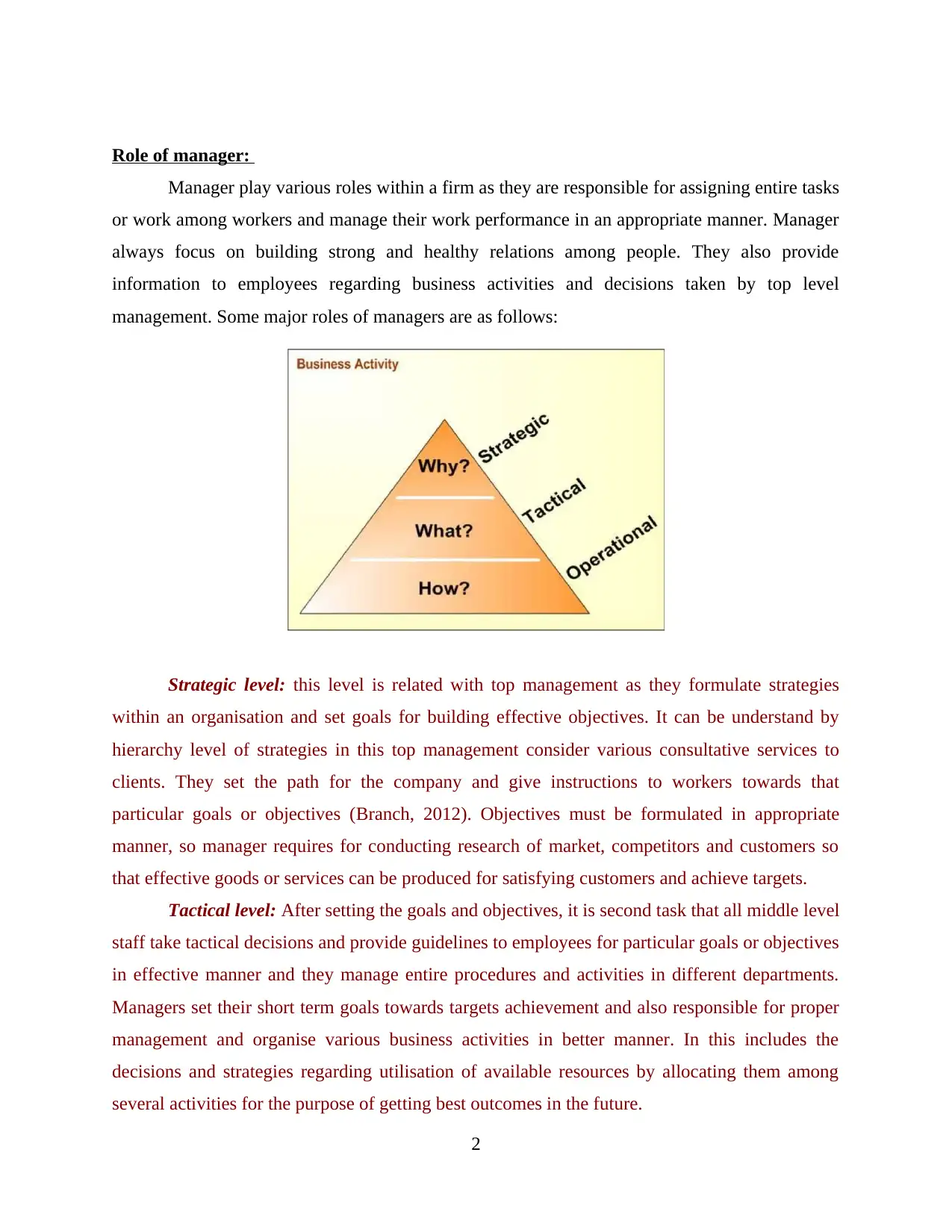
Role of manager:
Manager play various roles within a firm as they are responsible for assigning entire tasks
or work among workers and manage their work performance in an appropriate manner. Manager
always focus on building strong and healthy relations among people. They also provide
information to employees regarding business activities and decisions taken by top level
management. Some major roles of managers are as follows:
Strategic level: this level is related with top management as they formulate strategies
within an organisation and set goals for building effective objectives. It can be understand by
hierarchy level of strategies in this top management consider various consultative services to
clients. They set the path for the company and give instructions to workers towards that
particular goals or objectives (Branch, 2012). Objectives must be formulated in appropriate
manner, so manager requires for conducting research of market, competitors and customers so
that effective goods or services can be produced for satisfying customers and achieve targets.
Tactical level: After setting the goals and objectives, it is second task that all middle level
staff take tactical decisions and provide guidelines to employees for particular goals or objectives
in effective manner and they manage entire procedures and activities in different departments.
Managers set their short term goals towards targets achievement and also responsible for proper
management and organise various business activities in better manner. In this includes the
decisions and strategies regarding utilisation of available resources by allocating them among
several activities for the purpose of getting best outcomes in the future.
2
Manager play various roles within a firm as they are responsible for assigning entire tasks
or work among workers and manage their work performance in an appropriate manner. Manager
always focus on building strong and healthy relations among people. They also provide
information to employees regarding business activities and decisions taken by top level
management. Some major roles of managers are as follows:
Strategic level: this level is related with top management as they formulate strategies
within an organisation and set goals for building effective objectives. It can be understand by
hierarchy level of strategies in this top management consider various consultative services to
clients. They set the path for the company and give instructions to workers towards that
particular goals or objectives (Branch, 2012). Objectives must be formulated in appropriate
manner, so manager requires for conducting research of market, competitors and customers so
that effective goods or services can be produced for satisfying customers and achieve targets.
Tactical level: After setting the goals and objectives, it is second task that all middle level
staff take tactical decisions and provide guidelines to employees for particular goals or objectives
in effective manner and they manage entire procedures and activities in different departments.
Managers set their short term goals towards targets achievement and also responsible for proper
management and organise various business activities in better manner. In this includes the
decisions and strategies regarding utilisation of available resources by allocating them among
several activities for the purpose of getting best outcomes in the future.
2
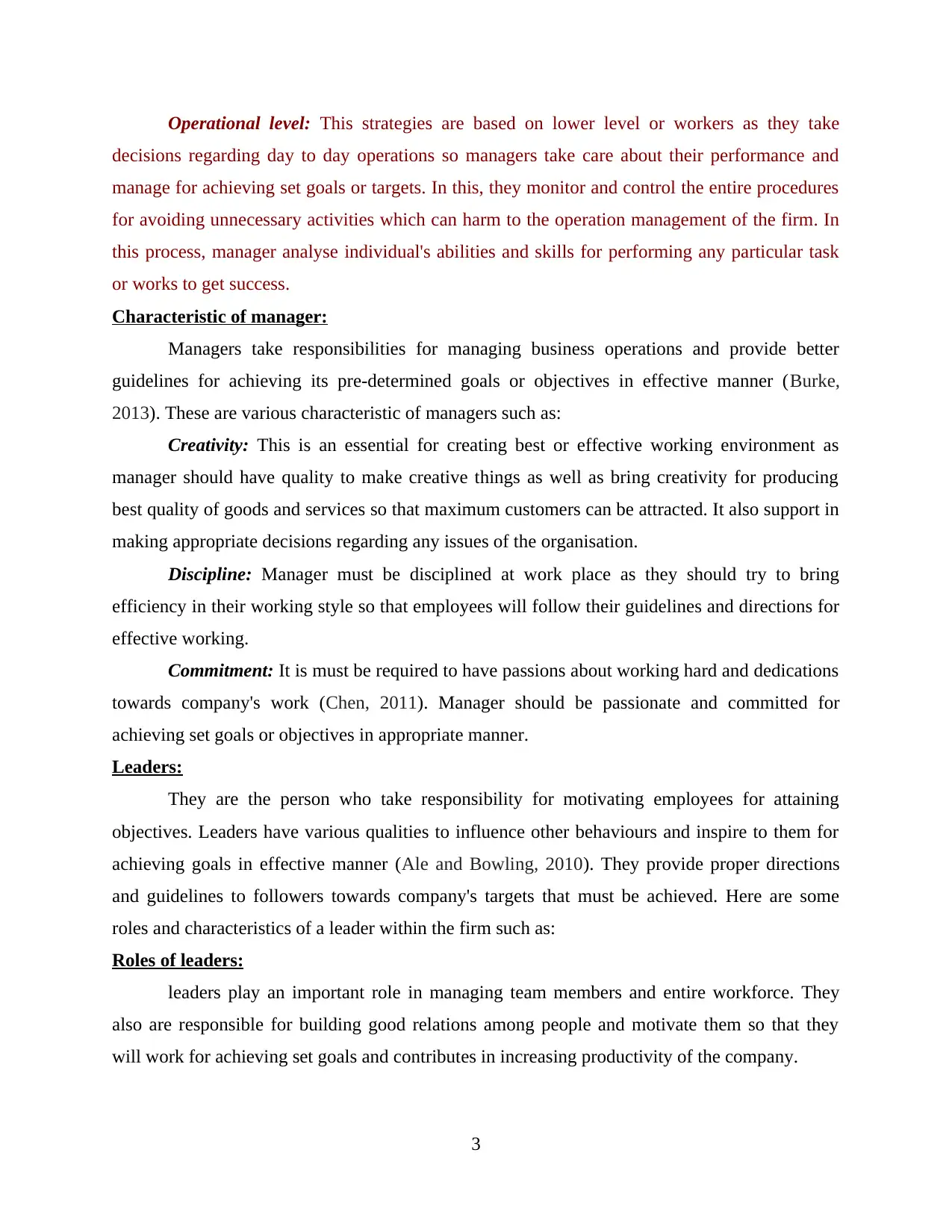
Operational level: This strategies are based on lower level or workers as they take
decisions regarding day to day operations so managers take care about their performance and
manage for achieving set goals or targets. In this, they monitor and control the entire procedures
for avoiding unnecessary activities which can harm to the operation management of the firm. In
this process, manager analyse individual's abilities and skills for performing any particular task
or works to get success.
Characteristic of manager:
Managers take responsibilities for managing business operations and provide better
guidelines for achieving its pre-determined goals or objectives in effective manner (Burke,
2013). These are various characteristic of managers such as:
Creativity: This is an essential for creating best or effective working environment as
manager should have quality to make creative things as well as bring creativity for producing
best quality of goods and services so that maximum customers can be attracted. It also support in
making appropriate decisions regarding any issues of the organisation.
Discipline: Manager must be disciplined at work place as they should try to bring
efficiency in their working style so that employees will follow their guidelines and directions for
effective working.
Commitment: It is must be required to have passions about working hard and dedications
towards company's work (Chen, 2011). Manager should be passionate and committed for
achieving set goals or objectives in appropriate manner.
Leaders:
They are the person who take responsibility for motivating employees for attaining
objectives. Leaders have various qualities to influence other behaviours and inspire to them for
achieving goals in effective manner (Ale and Bowling, 2010). They provide proper directions
and guidelines to followers towards company's targets that must be achieved. Here are some
roles and characteristics of a leader within the firm such as:
Roles of leaders:
leaders play an important role in managing team members and entire workforce. They
also are responsible for building good relations among people and motivate them so that they
will work for achieving set goals and contributes in increasing productivity of the company.
3
decisions regarding day to day operations so managers take care about their performance and
manage for achieving set goals or targets. In this, they monitor and control the entire procedures
for avoiding unnecessary activities which can harm to the operation management of the firm. In
this process, manager analyse individual's abilities and skills for performing any particular task
or works to get success.
Characteristic of manager:
Managers take responsibilities for managing business operations and provide better
guidelines for achieving its pre-determined goals or objectives in effective manner (Burke,
2013). These are various characteristic of managers such as:
Creativity: This is an essential for creating best or effective working environment as
manager should have quality to make creative things as well as bring creativity for producing
best quality of goods and services so that maximum customers can be attracted. It also support in
making appropriate decisions regarding any issues of the organisation.
Discipline: Manager must be disciplined at work place as they should try to bring
efficiency in their working style so that employees will follow their guidelines and directions for
effective working.
Commitment: It is must be required to have passions about working hard and dedications
towards company's work (Chen, 2011). Manager should be passionate and committed for
achieving set goals or objectives in appropriate manner.
Leaders:
They are the person who take responsibility for motivating employees for attaining
objectives. Leaders have various qualities to influence other behaviours and inspire to them for
achieving goals in effective manner (Ale and Bowling, 2010). They provide proper directions
and guidelines to followers towards company's targets that must be achieved. Here are some
roles and characteristics of a leader within the firm such as:
Roles of leaders:
leaders play an important role in managing team members and entire workforce. They
also are responsible for building good relations among people and motivate them so that they
will work for achieving set goals and contributes in increasing productivity of the company.
3
⊘ This is a preview!⊘
Do you want full access?
Subscribe today to unlock all pages.

Trusted by 1+ million students worldwide

Communicate:- Leaders always communicate with every and each person for regarding
company's decisions, policies and procedures so that barriers or conflicts can be resolved in
appropriate manner. It is an essential for building effective and healthy relations among people.
Monitoring:- This is very necessary for making effective and successful organisation as
manager and leaders monitor individual's skills and their capacities for performing any particular
tasks (Baboli, 2014). They also motivate and encourage them to face any kinds of challenges in
easy way.
Provide guidelines: Leaders always focus on providing guidelines as well as give
instructions to employees for attaining specific goals or targets in limited time period.
Characteristic of leaders:
Motivation: It is an important task for leader to motivate their followers for facing or
accepting any of changes as well as challenges within the firm (Cruz, 2011). They also give
instructions for achieving business goals in defining time period.
Confident: Leaders must be self-confident for leading all people and inspire their
behaviour which support in getting work done. This quality is necessary for managing entire
operations and workforce in better ways.
Communication skills: Leaders should have better communication skills for interacting
with every employees so that good relation can be maintain and also make effective organisation
workforce.
There are some major difference between leaders and managers. These are given below:
Managers Leaders
Manager set path or goals for company. Leaders works as persuading those goals that
developed by the manager.
They provide information regarding firm's
policies and procedures to leaders.
Leaders communicate all those information
and policies to employees for work (Branch,
2012).
Managers provide directions and guidelines to
team members and leaders.
They give directions to employees towards
organisational goals and objectives.
4
company's decisions, policies and procedures so that barriers or conflicts can be resolved in
appropriate manner. It is an essential for building effective and healthy relations among people.
Monitoring:- This is very necessary for making effective and successful organisation as
manager and leaders monitor individual's skills and their capacities for performing any particular
tasks (Baboli, 2014). They also motivate and encourage them to face any kinds of challenges in
easy way.
Provide guidelines: Leaders always focus on providing guidelines as well as give
instructions to employees for attaining specific goals or targets in limited time period.
Characteristic of leaders:
Motivation: It is an important task for leader to motivate their followers for facing or
accepting any of changes as well as challenges within the firm (Cruz, 2011). They also give
instructions for achieving business goals in defining time period.
Confident: Leaders must be self-confident for leading all people and inspire their
behaviour which support in getting work done. This quality is necessary for managing entire
operations and workforce in better ways.
Communication skills: Leaders should have better communication skills for interacting
with every employees so that good relation can be maintain and also make effective organisation
workforce.
There are some major difference between leaders and managers. These are given below:
Managers Leaders
Manager set path or goals for company. Leaders works as persuading those goals that
developed by the manager.
They provide information regarding firm's
policies and procedures to leaders.
Leaders communicate all those information
and policies to employees for work (Branch,
2012).
Managers provide directions and guidelines to
team members and leaders.
They give directions to employees towards
organisational goals and objectives.
4
Paraphrase This Document
Need a fresh take? Get an instant paraphrase of this document with our AI Paraphraser
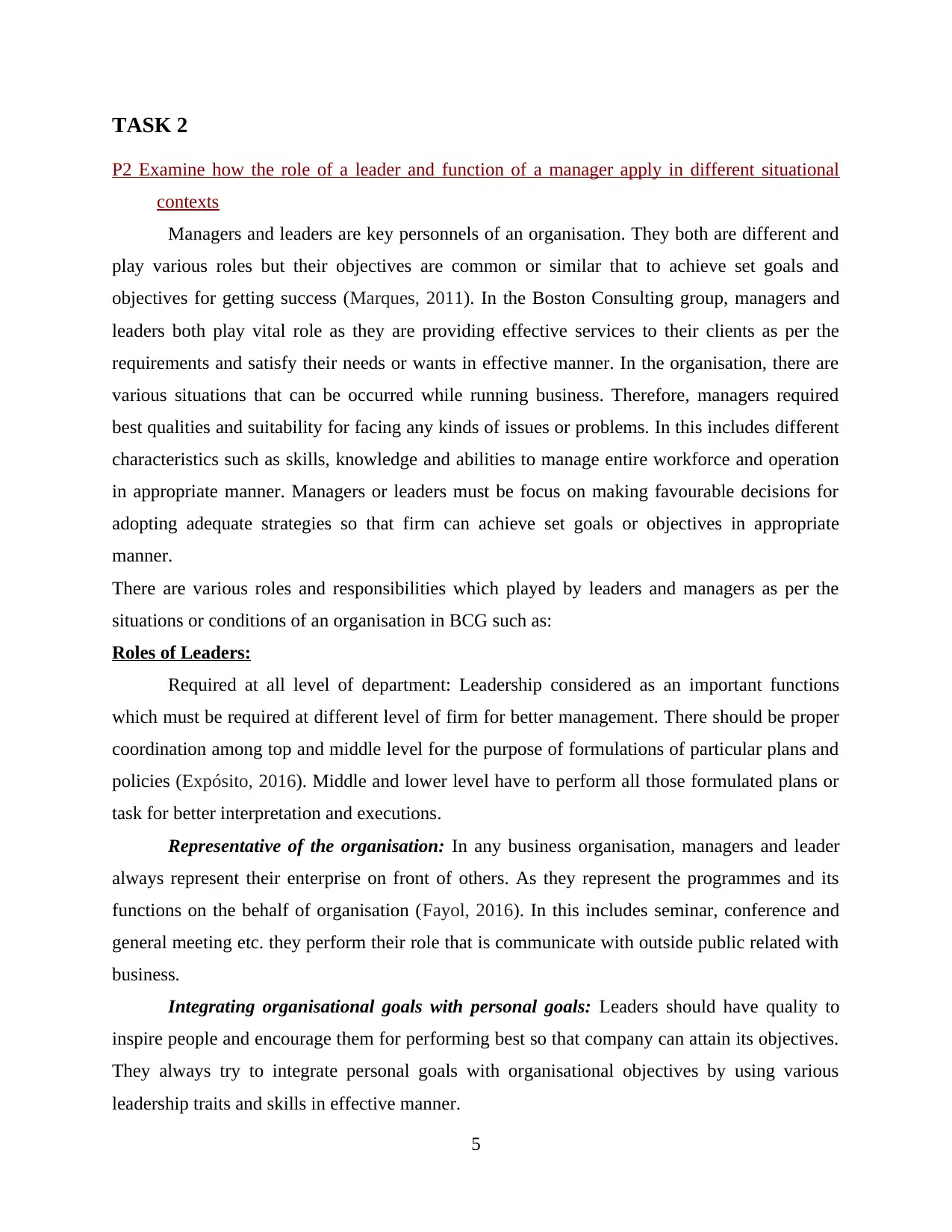
TASK 2
P2 Examine how the role of a leader and function of a manager apply in different situational
contexts
Managers and leaders are key personnels of an organisation. They both are different and
play various roles but their objectives are common or similar that to achieve set goals and
objectives for getting success (Marques, 2011). In the Boston Consulting group, managers and
leaders both play vital role as they are providing effective services to their clients as per the
requirements and satisfy their needs or wants in effective manner. In the organisation, there are
various situations that can be occurred while running business. Therefore, managers required
best qualities and suitability for facing any kinds of issues or problems. In this includes different
characteristics such as skills, knowledge and abilities to manage entire workforce and operation
in appropriate manner. Managers or leaders must be focus on making favourable decisions for
adopting adequate strategies so that firm can achieve set goals or objectives in appropriate
manner.
There are various roles and responsibilities which played by leaders and managers as per the
situations or conditions of an organisation in BCG such as:
Roles of Leaders:
Required at all level of department: Leadership considered as an important functions
which must be required at different level of firm for better management. There should be proper
coordination among top and middle level for the purpose of formulations of particular plans and
policies (Expósito, 2016). Middle and lower level have to perform all those formulated plans or
task for better interpretation and executions.
Representative of the organisation: In any business organisation, managers and leader
always represent their enterprise on front of others. As they represent the programmes and its
functions on the behalf of organisation (Fayol, 2016). In this includes seminar, conference and
general meeting etc. they perform their role that is communicate with outside public related with
business.
Integrating organisational goals with personal goals: Leaders should have quality to
inspire people and encourage them for performing best so that company can attain its objectives.
They always try to integrate personal goals with organisational objectives by using various
leadership traits and skills in effective manner.
5
P2 Examine how the role of a leader and function of a manager apply in different situational
contexts
Managers and leaders are key personnels of an organisation. They both are different and
play various roles but their objectives are common or similar that to achieve set goals and
objectives for getting success (Marques, 2011). In the Boston Consulting group, managers and
leaders both play vital role as they are providing effective services to their clients as per the
requirements and satisfy their needs or wants in effective manner. In the organisation, there are
various situations that can be occurred while running business. Therefore, managers required
best qualities and suitability for facing any kinds of issues or problems. In this includes different
characteristics such as skills, knowledge and abilities to manage entire workforce and operation
in appropriate manner. Managers or leaders must be focus on making favourable decisions for
adopting adequate strategies so that firm can achieve set goals or objectives in appropriate
manner.
There are various roles and responsibilities which played by leaders and managers as per the
situations or conditions of an organisation in BCG such as:
Roles of Leaders:
Required at all level of department: Leadership considered as an important functions
which must be required at different level of firm for better management. There should be proper
coordination among top and middle level for the purpose of formulations of particular plans and
policies (Expósito, 2016). Middle and lower level have to perform all those formulated plans or
task for better interpretation and executions.
Representative of the organisation: In any business organisation, managers and leader
always represent their enterprise on front of others. As they represent the programmes and its
functions on the behalf of organisation (Fayol, 2016). In this includes seminar, conference and
general meeting etc. they perform their role that is communicate with outside public related with
business.
Integrating organisational goals with personal goals: Leaders should have quality to
inspire people and encourage them for performing best so that company can attain its objectives.
They always try to integrate personal goals with organisational objectives by using various
leadership traits and skills in effective manner.
5
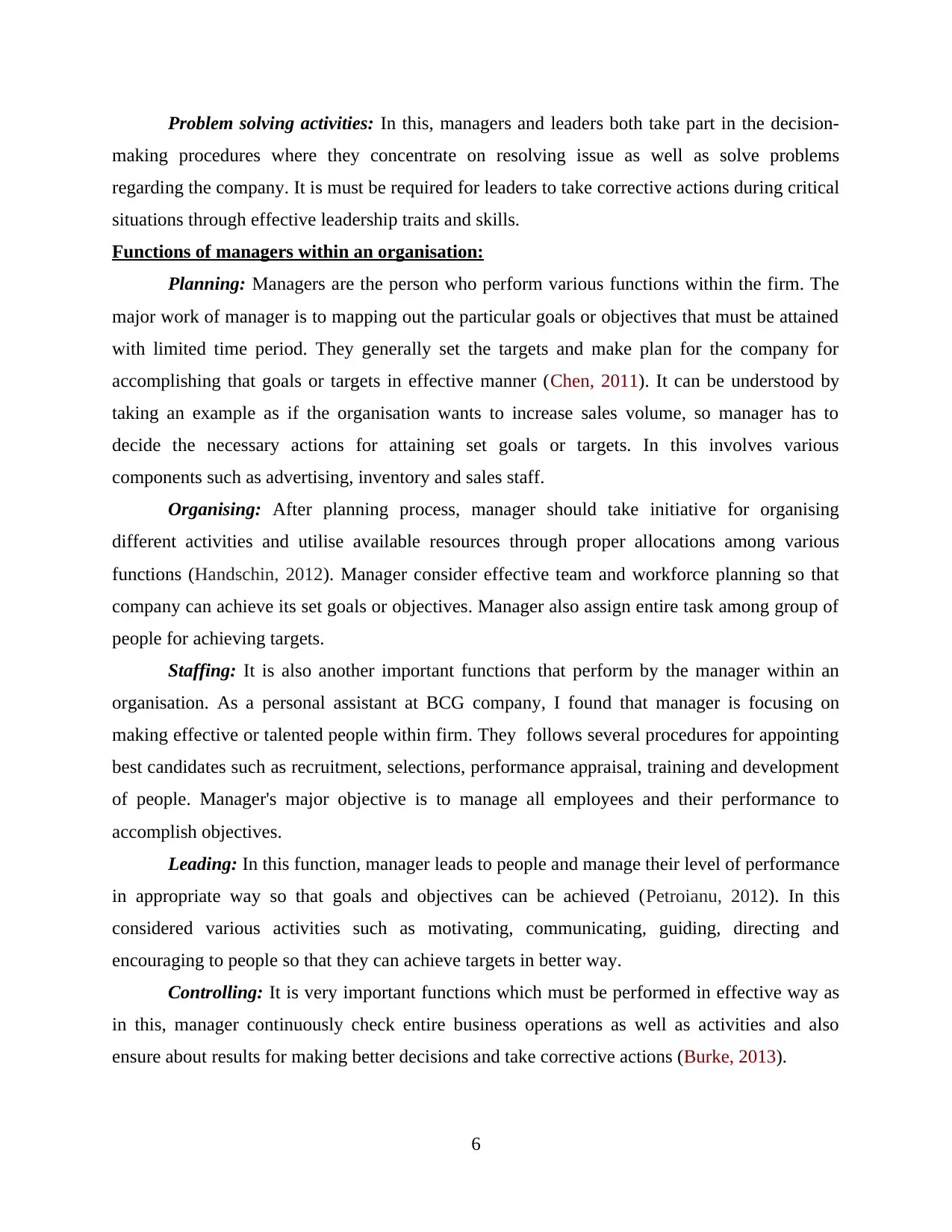
Problem solving activities: In this, managers and leaders both take part in the decision-
making procedures where they concentrate on resolving issue as well as solve problems
regarding the company. It is must be required for leaders to take corrective actions during critical
situations through effective leadership traits and skills.
Functions of managers within an organisation:
Planning: Managers are the person who perform various functions within the firm. The
major work of manager is to mapping out the particular goals or objectives that must be attained
with limited time period. They generally set the targets and make plan for the company for
accomplishing that goals or targets in effective manner (Chen, 2011). It can be understood by
taking an example as if the organisation wants to increase sales volume, so manager has to
decide the necessary actions for attaining set goals or targets. In this involves various
components such as advertising, inventory and sales staff.
Organising: After planning process, manager should take initiative for organising
different activities and utilise available resources through proper allocations among various
functions (Handschin, 2012). Manager consider effective team and workforce planning so that
company can achieve its set goals or objectives. Manager also assign entire task among group of
people for achieving targets.
Staffing: It is also another important functions that perform by the manager within an
organisation. As a personal assistant at BCG company, I found that manager is focusing on
making effective or talented people within firm. They follows several procedures for appointing
best candidates such as recruitment, selections, performance appraisal, training and development
of people. Manager's major objective is to manage all employees and their performance to
accomplish objectives.
Leading: In this function, manager leads to people and manage their level of performance
in appropriate way so that goals and objectives can be achieved (Petroianu, 2012). In this
considered various activities such as motivating, communicating, guiding, directing and
encouraging to people so that they can achieve targets in better way.
Controlling: It is very important functions which must be performed in effective way as
in this, manager continuously check entire business operations as well as activities and also
ensure about results for making better decisions and take corrective actions (Burke, 2013).
6
making procedures where they concentrate on resolving issue as well as solve problems
regarding the company. It is must be required for leaders to take corrective actions during critical
situations through effective leadership traits and skills.
Functions of managers within an organisation:
Planning: Managers are the person who perform various functions within the firm. The
major work of manager is to mapping out the particular goals or objectives that must be attained
with limited time period. They generally set the targets and make plan for the company for
accomplishing that goals or targets in effective manner (Chen, 2011). It can be understood by
taking an example as if the organisation wants to increase sales volume, so manager has to
decide the necessary actions for attaining set goals or targets. In this involves various
components such as advertising, inventory and sales staff.
Organising: After planning process, manager should take initiative for organising
different activities and utilise available resources through proper allocations among various
functions (Handschin, 2012). Manager consider effective team and workforce planning so that
company can achieve its set goals or objectives. Manager also assign entire task among group of
people for achieving targets.
Staffing: It is also another important functions that perform by the manager within an
organisation. As a personal assistant at BCG company, I found that manager is focusing on
making effective or talented people within firm. They follows several procedures for appointing
best candidates such as recruitment, selections, performance appraisal, training and development
of people. Manager's major objective is to manage all employees and their performance to
accomplish objectives.
Leading: In this function, manager leads to people and manage their level of performance
in appropriate way so that goals and objectives can be achieved (Petroianu, 2012). In this
considered various activities such as motivating, communicating, guiding, directing and
encouraging to people so that they can achieve targets in better way.
Controlling: It is very important functions which must be performed in effective way as
in this, manager continuously check entire business operations as well as activities and also
ensure about results for making better decisions and take corrective actions (Burke, 2013).
6
⊘ This is a preview!⊘
Do you want full access?
Subscribe today to unlock all pages.

Trusted by 1+ million students worldwide
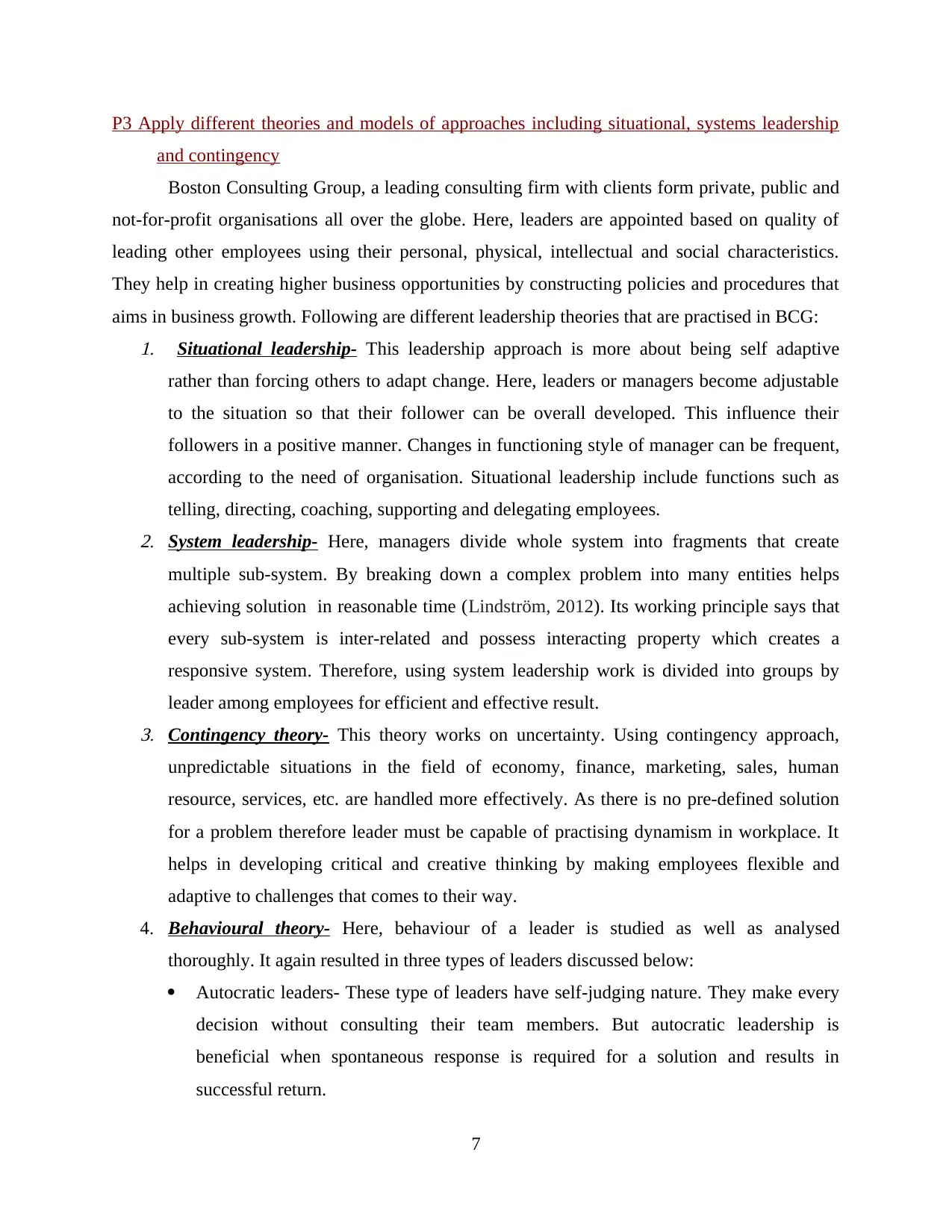
P3 Apply different theories and models of approaches including situational, systems leadership
and contingency
Boston Consulting Group, a leading consulting firm with clients form private, public and
not-for-profit organisations all over the globe. Here, leaders are appointed based on quality of
leading other employees using their personal, physical, intellectual and social characteristics.
They help in creating higher business opportunities by constructing policies and procedures that
aims in business growth. Following are different leadership theories that are practised in BCG:1. Situational leadership- This leadership approach is more about being self adaptive
rather than forcing others to adapt change. Here, leaders or managers become adjustable
to the situation so that their follower can be overall developed. This influence their
followers in a positive manner. Changes in functioning style of manager can be frequent,
according to the need of organisation. Situational leadership include functions such as
telling, directing, coaching, supporting and delegating employees.2. System leadership- Here, managers divide whole system into fragments that create
multiple sub-system. By breaking down a complex problem into many entities helps
achieving solution in reasonable time (Lindström, 2012). Its working principle says that
every sub-system is inter-related and possess interacting property which creates a
responsive system. Therefore, using system leadership work is divided into groups by
leader among employees for efficient and effective result.3. Contingency theory- This theory works on uncertainty. Using contingency approach,
unpredictable situations in the field of economy, finance, marketing, sales, human
resource, services, etc. are handled more effectively. As there is no pre-defined solution
for a problem therefore leader must be capable of practising dynamism in workplace. It
helps in developing critical and creative thinking by making employees flexible and
adaptive to challenges that comes to their way.
4. Behavioural theory- Here, behaviour of a leader is studied as well as analysed
thoroughly. It again resulted in three types of leaders discussed below:
Autocratic leaders- These type of leaders have self-judging nature. They make every
decision without consulting their team members. But autocratic leadership is
beneficial when spontaneous response is required for a solution and results in
successful return.
7
and contingency
Boston Consulting Group, a leading consulting firm with clients form private, public and
not-for-profit organisations all over the globe. Here, leaders are appointed based on quality of
leading other employees using their personal, physical, intellectual and social characteristics.
They help in creating higher business opportunities by constructing policies and procedures that
aims in business growth. Following are different leadership theories that are practised in BCG:1. Situational leadership- This leadership approach is more about being self adaptive
rather than forcing others to adapt change. Here, leaders or managers become adjustable
to the situation so that their follower can be overall developed. This influence their
followers in a positive manner. Changes in functioning style of manager can be frequent,
according to the need of organisation. Situational leadership include functions such as
telling, directing, coaching, supporting and delegating employees.2. System leadership- Here, managers divide whole system into fragments that create
multiple sub-system. By breaking down a complex problem into many entities helps
achieving solution in reasonable time (Lindström, 2012). Its working principle says that
every sub-system is inter-related and possess interacting property which creates a
responsive system. Therefore, using system leadership work is divided into groups by
leader among employees for efficient and effective result.3. Contingency theory- This theory works on uncertainty. Using contingency approach,
unpredictable situations in the field of economy, finance, marketing, sales, human
resource, services, etc. are handled more effectively. As there is no pre-defined solution
for a problem therefore leader must be capable of practising dynamism in workplace. It
helps in developing critical and creative thinking by making employees flexible and
adaptive to challenges that comes to their way.
4. Behavioural theory- Here, behaviour of a leader is studied as well as analysed
thoroughly. It again resulted in three types of leaders discussed below:
Autocratic leaders- These type of leaders have self-judging nature. They make every
decision without consulting their team members. But autocratic leadership is
beneficial when spontaneous response is required for a solution and results in
successful return.
7
Paraphrase This Document
Need a fresh take? Get an instant paraphrase of this document with our AI Paraphraser
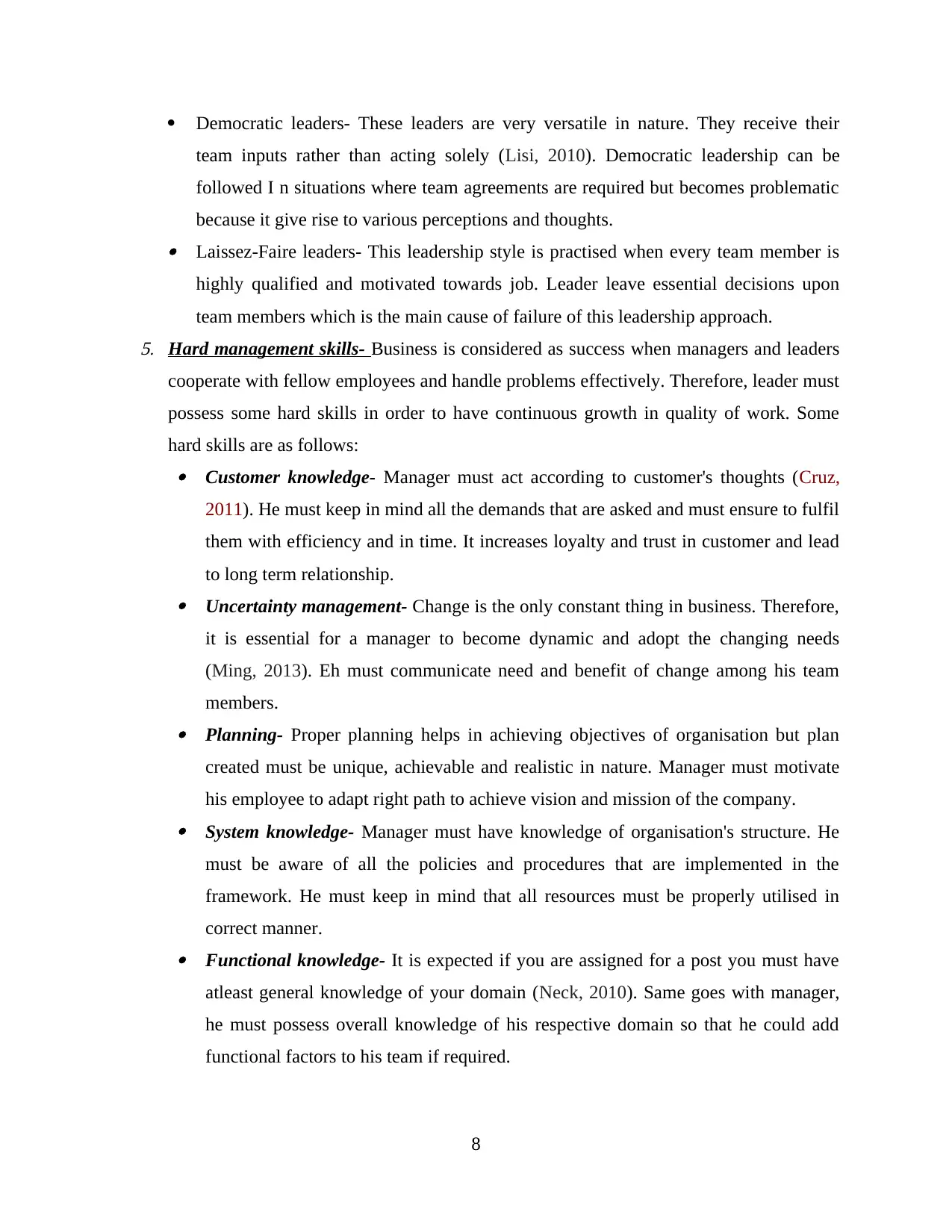
Democratic leaders- These leaders are very versatile in nature. They receive their
team inputs rather than acting solely (Lisi, 2010). Democratic leadership can be
followed I n situations where team agreements are required but becomes problematic
because it give rise to various perceptions and thoughts.
Laissez-Faire leaders- This leadership style is practised when every team member is
highly qualified and motivated towards job. Leader leave essential decisions upon
team members which is the main cause of failure of this leadership approach.5. Hard management skills- Business is considered as success when managers and leaders
cooperate with fellow employees and handle problems effectively. Therefore, leader must
possess some hard skills in order to have continuous growth in quality of work. Some
hard skills are as follows:
Customer knowledge- Manager must act according to customer's thoughts (Cruz,
2011). He must keep in mind all the demands that are asked and must ensure to fulfil
them with efficiency and in time. It increases loyalty and trust in customer and lead
to long term relationship.
Uncertainty management- Change is the only constant thing in business. Therefore,
it is essential for a manager to become dynamic and adopt the changing needs
(Ming, 2013). Eh must communicate need and benefit of change among his team
members.
Planning- Proper planning helps in achieving objectives of organisation but plan
created must be unique, achievable and realistic in nature. Manager must motivate
his employee to adapt right path to achieve vision and mission of the company.
System knowledge- Manager must have knowledge of organisation's structure. He
must be aware of all the policies and procedures that are implemented in the
framework. He must keep in mind that all resources must be properly utilised in
correct manner.
Functional knowledge- It is expected if you are assigned for a post you must have
atleast general knowledge of your domain (Neck, 2010). Same goes with manager,
he must possess overall knowledge of his respective domain so that he could add
functional factors to his team if required.
8
team inputs rather than acting solely (Lisi, 2010). Democratic leadership can be
followed I n situations where team agreements are required but becomes problematic
because it give rise to various perceptions and thoughts.
Laissez-Faire leaders- This leadership style is practised when every team member is
highly qualified and motivated towards job. Leader leave essential decisions upon
team members which is the main cause of failure of this leadership approach.5. Hard management skills- Business is considered as success when managers and leaders
cooperate with fellow employees and handle problems effectively. Therefore, leader must
possess some hard skills in order to have continuous growth in quality of work. Some
hard skills are as follows:
Customer knowledge- Manager must act according to customer's thoughts (Cruz,
2011). He must keep in mind all the demands that are asked and must ensure to fulfil
them with efficiency and in time. It increases loyalty and trust in customer and lead
to long term relationship.
Uncertainty management- Change is the only constant thing in business. Therefore,
it is essential for a manager to become dynamic and adopt the changing needs
(Ming, 2013). Eh must communicate need and benefit of change among his team
members.
Planning- Proper planning helps in achieving objectives of organisation but plan
created must be unique, achievable and realistic in nature. Manager must motivate
his employee to adapt right path to achieve vision and mission of the company.
System knowledge- Manager must have knowledge of organisation's structure. He
must be aware of all the policies and procedures that are implemented in the
framework. He must keep in mind that all resources must be properly utilised in
correct manner.
Functional knowledge- It is expected if you are assigned for a post you must have
atleast general knowledge of your domain (Neck, 2010). Same goes with manager,
he must possess overall knowledge of his respective domain so that he could add
functional factors to his team if required.
8
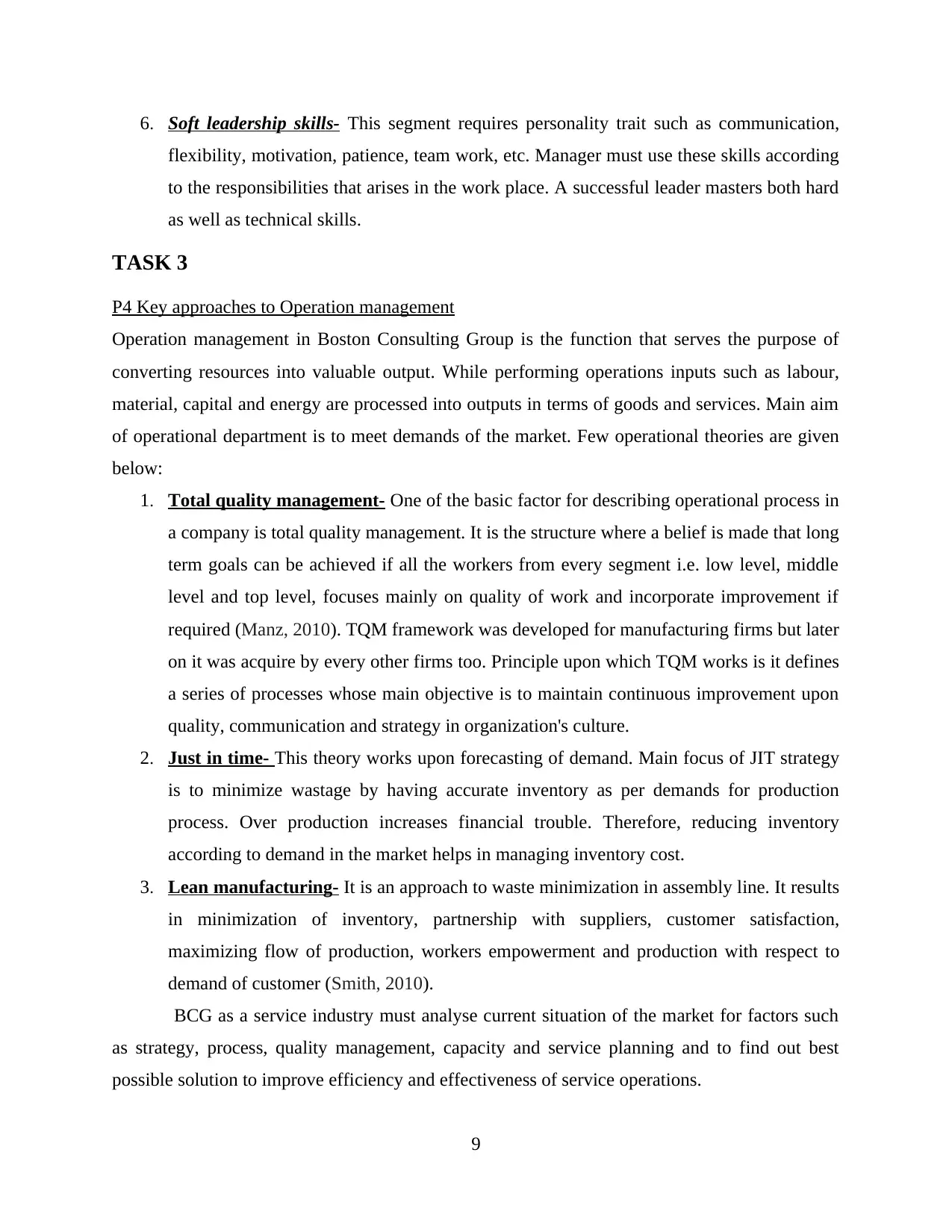
6. Soft leadership skills- This segment requires personality trait such as communication,
flexibility, motivation, patience, team work, etc. Manager must use these skills according
to the responsibilities that arises in the work place. A successful leader masters both hard
as well as technical skills.
TASK 3
P4 Key approaches to Operation management
Operation management in Boston Consulting Group is the function that serves the purpose of
converting resources into valuable output. While performing operations inputs such as labour,
material, capital and energy are processed into outputs in terms of goods and services. Main aim
of operational department is to meet demands of the market. Few operational theories are given
below:
1. Total quality management- One of the basic factor for describing operational process in
a company is total quality management. It is the structure where a belief is made that long
term goals can be achieved if all the workers from every segment i.e. low level, middle
level and top level, focuses mainly on quality of work and incorporate improvement if
required (Manz, 2010). TQM framework was developed for manufacturing firms but later
on it was acquire by every other firms too. Principle upon which TQM works is it defines
a series of processes whose main objective is to maintain continuous improvement upon
quality, communication and strategy in organization's culture.
2. Just in time- This theory works upon forecasting of demand. Main focus of JIT strategy
is to minimize wastage by having accurate inventory as per demands for production
process. Over production increases financial trouble. Therefore, reducing inventory
according to demand in the market helps in managing inventory cost.
3. Lean manufacturing- It is an approach to waste minimization in assembly line. It results
in minimization of inventory, partnership with suppliers, customer satisfaction,
maximizing flow of production, workers empowerment and production with respect to
demand of customer (Smith, 2010).
BCG as a service industry must analyse current situation of the market for factors such
as strategy, process, quality management, capacity and service planning and to find out best
possible solution to improve efficiency and effectiveness of service operations.
9
flexibility, motivation, patience, team work, etc. Manager must use these skills according
to the responsibilities that arises in the work place. A successful leader masters both hard
as well as technical skills.
TASK 3
P4 Key approaches to Operation management
Operation management in Boston Consulting Group is the function that serves the purpose of
converting resources into valuable output. While performing operations inputs such as labour,
material, capital and energy are processed into outputs in terms of goods and services. Main aim
of operational department is to meet demands of the market. Few operational theories are given
below:
1. Total quality management- One of the basic factor for describing operational process in
a company is total quality management. It is the structure where a belief is made that long
term goals can be achieved if all the workers from every segment i.e. low level, middle
level and top level, focuses mainly on quality of work and incorporate improvement if
required (Manz, 2010). TQM framework was developed for manufacturing firms but later
on it was acquire by every other firms too. Principle upon which TQM works is it defines
a series of processes whose main objective is to maintain continuous improvement upon
quality, communication and strategy in organization's culture.
2. Just in time- This theory works upon forecasting of demand. Main focus of JIT strategy
is to minimize wastage by having accurate inventory as per demands for production
process. Over production increases financial trouble. Therefore, reducing inventory
according to demand in the market helps in managing inventory cost.
3. Lean manufacturing- It is an approach to waste minimization in assembly line. It results
in minimization of inventory, partnership with suppliers, customer satisfaction,
maximizing flow of production, workers empowerment and production with respect to
demand of customer (Smith, 2010).
BCG as a service industry must analyse current situation of the market for factors such
as strategy, process, quality management, capacity and service planning and to find out best
possible solution to improve efficiency and effectiveness of service operations.
9
⊘ This is a preview!⊘
Do you want full access?
Subscribe today to unlock all pages.

Trusted by 1+ million students worldwide
1 out of 18
Related Documents
Your All-in-One AI-Powered Toolkit for Academic Success.
+13062052269
info@desklib.com
Available 24*7 on WhatsApp / Email
![[object Object]](/_next/static/media/star-bottom.7253800d.svg)
Unlock your academic potential
Copyright © 2020–2026 A2Z Services. All Rights Reserved. Developed and managed by ZUCOL.





